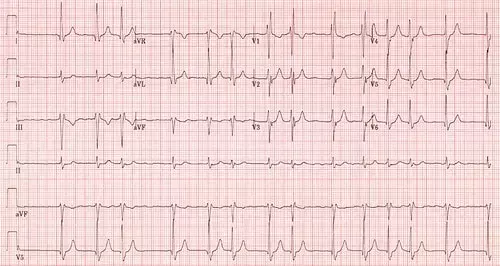- Home
- Medical news & Guidelines
- Anesthesiology
- Cardiology and CTVS
- Critical Care
- Dentistry
- Dermatology
- Diabetes and Endocrinology
- ENT
- Gastroenterology
- Medicine
- Nephrology
- Neurology
- Obstretics-Gynaecology
- Oncology
- Ophthalmology
- Orthopaedics
- Pediatrics-Neonatology
- Psychiatry
- Pulmonology
- Radiology
- Surgery
- Urology
- Laboratory Medicine
- Diet
- Nursing
- Paramedical
- Physiotherapy
- Health news
- Fact Check
- Bone Health Fact Check
- Brain Health Fact Check
- Cancer Related Fact Check
- Child Care Fact Check
- Dental and oral health fact check
- Diabetes and metabolic health fact check
- Diet and Nutrition Fact Check
- Eye and ENT Care Fact Check
- Fitness fact check
- Gut health fact check
- Heart health fact check
- Kidney health fact check
- Medical education fact check
- Men's health fact check
- Respiratory fact check
- Skin and hair care fact check
- Vaccine and Immunization fact check
- Women's health fact check
- AYUSH
- State News
- Andaman and Nicobar Islands
- Andhra Pradesh
- Arunachal Pradesh
- Assam
- Bihar
- Chandigarh
- Chattisgarh
- Dadra and Nagar Haveli
- Daman and Diu
- Delhi
- Goa
- Gujarat
- Haryana
- Himachal Pradesh
- Jammu & Kashmir
- Jharkhand
- Karnataka
- Kerala
- Ladakh
- Lakshadweep
- Madhya Pradesh
- Maharashtra
- Manipur
- Meghalaya
- Mizoram
- Nagaland
- Odisha
- Puducherry
- Punjab
- Rajasthan
- Sikkim
- Tamil Nadu
- Telangana
- Tripura
- Uttar Pradesh
- Uttrakhand
- West Bengal
- Medical Education
- Industry
Elevated Lp(a) levels increase risk of Atrial fibrillation

Elevated Lp(a) levels increase the risk of atrial fibrillation independent of its association with ischemic heart disease and aortic valve stenosis, according to a recent study published in the Journal of the American College of Cardiology
Atrial fibrillation (AF) is a cardiac arrhythmia associated with an elevated risk of stroke, heart failure, and mortality. However, preventative therapies are needed with ancillary benefits on its cardiovascular comorbidities. Lipoprotein(a) (Lp[a]) is a recognized risk factor for atherosclerotic cardiovascular disease (ASCVD), which itself increases atrial fibrillation risk, but it remains unknown whether Lp(a) is a causal mediator of AF independent of atherosclerotic cardiovascular disease.
Objectives
This study investigated the role of Lp(a) in atrial fibrillation and whether it is independent of atherosclerotic cardiovascular disease. Measured and genetically predicted Lp(a) levels were tested for association with 20,432 cases of incident atrial fibrillation in the UK Biobank Mendelian randomization analyses were performed by using summary-level data for AF from publicly available genome-wide association studies (N = 1,145,375).
Results:
- In the UK Biobank, each 50 nmol/L (23 mg/dL) increase in Lp(a) was associated with an increased risk of incident atrial fibrillation using measured Lp(a) and genetically predicted Lp(a)
- Mendelian randomization analyses using independent data replicated the effect
- There was no evidence of risk-conferring effect from low-density lipoprotein cholesterol or triglycerides, and only 39% of Lp(a) risk was mediated through atherosclerotic cardiovascular disease, suggesting that Lp(a) partly influences atrial fibrillation independent of its known effects on atherosclerotic cardiovascular disease.
Thus, the findings implicate Lp(a) as a potential causal mediator in the development of atrial fibrillation which show that the effects of Lp(a) extend across myocardial tissues. Ongoing clinical trials for Lp(a)-lowering therapies should evaluate effects on atrial fibrillation prevention.
Reference:
Elevated Lipoprotein(a) and Risk of Atrial Fibrillation: An Observational and Mendelian Randomization Study by Pedrum Mohammadi-Shemirani et al. published in the Journal of the American College of Cardiology.
https://www.jacc.org/doi/10.1016/j.jacc.2022.02.018
Keywords:
Elevated, Lp(a) levels, increase, risk, atrial fibrillation, independent, association, ischemic heart disease, aortic valve stenosis, Journal of the American College of Cardiology, Pedrum Mohammadi-Shemirani, Michael Chong, Sukrit Narula, Nicolas Perrot, David Conen, Jason D. Roberts, Sébastien Thériault, Yohan Bossé, Matthew B. Lanktree, Marie Pigeyre, and Guillaume Paré, atherosclerotic cardiovascular disease
Dr. Shravani Dali has completed her BDS from Pravara institute of medical sciences, loni. Following which she extensively worked in the healthcare sector for 2+ years. She has been actively involved in writing blogs in field of health and wellness. Currently she is pursuing her Masters of public health-health administration from Tata institute of social sciences. She can be contacted at editorial@medicaldialogues.in.
Dr Kamal Kant Kohli-MBBS, DTCD- a chest specialist with more than 30 years of practice and a flair for writing clinical articles, Dr Kamal Kant Kohli joined Medical Dialogues as a Chief Editor of Medical News. Besides writing articles, as an editor, he proofreads and verifies all the medical content published on Medical Dialogues including those coming from journals, studies,medical conferences,guidelines etc. Email: drkohli@medicaldialogues.in. Contact no. 011-43720751


